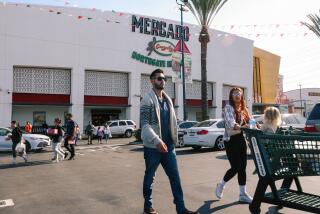Pioneer Market Alpha Beta Started on a $300 Stake
- Share via
At one time you would find the ant powder next to the asparagus at Alpha Beta. And the zucchini would have been next to the zippers.
That is why they called it Alpha Beta.
But the chain that started as a meat market in Pomona and soon expanded into Orange County has come a long way since its turn-of-the-century origin.
Today, there are 248 Alpha Beta stores scattered up and down California. And now that the chain’s owner, American Stores, has completed a $2.5-billion takeover of rival Lucky Stores, Alpha Beta will become part of the nation’s largest supermarket company.
As part of the merger, American Stores plans to convert its Alpha Beta outlets into Lucky markets. The 73-year-old Alpha Beta name will be retired.
It is an unlikely end for a grocery chain that at one time was far and away the leader among Southern California shoppers.
Contrary to popular lore, Alpha Beta wasn’t founded by Mormons. In fact, in the beginning, it wasn’t even called Alpha Beta.
In the fall of 1900, Albert and Hugh Gerrard, the sons of a Disciples of Christ preacher, used their entire $300 savings to bankroll the first Gerrard’s Market in Pomona. They were later joined by a third brother, Will.
The fledgling butcher shop did very well, and the Gerrards later moved into Orange County, where they opened four meat markets in the Santa Ana, Tustin and Orange area.
According to “The Alpha Beta Story,” a privately published book, the Orange County stores were christened Triangle Cash Markets--a reference to the Holy Trinity.
The Gerrards’ “grocerterias” offered something new. While competitors like Piggly Wiggly and Morrisons were using clerks to fill orders, the Gerrards introduced self-service in their stores. Groceries were stacked in alphabetical order, and shoppers were encouraged to find their own merchandise without bothering clerks.
The concept proved so popular that in 1919, the chain was renamed “Alpha Beta”--a reference to the alphabetical stocking system.
Within a decade, the Gerrard brothers were overseeing a business that generated sales of $3 million a year. The 25 stores were operated by other individuals or partnerships, with Gerrard family members owning a majority interest in each.
As the business became more complex, the owners decided in 1929 to incorporate--in part, to take advantage of federal tax laws providing benefits for corporations.
The chain grew rapidly, opening its first two supermarkets in 1932 as part of an “experiment.” The stores--one in Santa Ana and the other in Pomona--featured huge, open cases of merchandise--the sort of no-frills display used in today’s big warehouse markets.
“Basically, they advertised huge displays at the bare-bones, lowest price possible,” said Esther Cramer, who wrote the history of the chain. “Alpha Beta was the first in the nation to have anything like a supermarket.”
A Huntington Beach meat-packing plant was added in 1935. Within two years, the company bought cattle-feeding ranches, one in Santa Ana Canyon and another near Mission Viejo. The first warehouse was built in La Habra, soon after the chain moved its headquarters there in 1952. Eventually, the company opened a creamery, a bakery, Alphy’s coffee shops, and even an Alpha Beta Travel Service.
Alcohol wasn’t sold in Alpha Beta stores until 1975, reflecting the attitude of the Gerrard brothers, who were “dead against it,” recalled Claude Edwards, whose 51 years with the chain--25 of them as president or chairman--earned him the title of “Mr. Alpha Beta.”
The company’s roster of stores expanded steadily--in part through mergers but not hostile takeovers. “We were gentlemen. We didn’t know anything about takeovers,” Edwards explained.
The acquisitions included Alpha Beta’s purchase of 13 Raisin Markets in 1959, bringing the chain to 49 stores. Ironically, Alpha Beta passed up a chance to buy out Lucky in 1950.
By 1961, the company had 100 stores. Edwards decided to increase the firm’s financial resources by merging with American Stores, a publicly held company with 810 supermarkets.
“That began our period of greatest growth,” recalled Edwards, now retired and living in South Laguna.
Yet even after the merger, Alpha Beta retained its homey, folksy character. “It was very much like a family group,” said Helen Dodge of Whittier, a secretary and claims administrator. “You could walk down the hall and say, ‘Hi, Mr. Edwards,’ and he’d know everybody’s name.”
That cracker-barrel atmosphere changed soon after American Stores, in turn, was acquired by L.S. (Sam) Skaggs in a March, 1979, leveraged buyout. The debt-financed transaction left little money for expansion and prompted the sale of some operations.
To Edwards, the best days of Alpha Beta had already ended. Were he to do it all over again, he said recently, he wouldn’t have transformed Alpha Beta into a publicly owned company by merging with American Stores.
“I don’t think I ever would have gone public. The happiest time I had was when the company was very closely held. We weren’t accountable to anybody but ourselves--and the government, of course,” Edwards said.
“As the one who gave birth to most of (the chain), seeing it end makes me a little sad.”
More to Read
Inside the business of entertainment
The Wide Shot brings you news, analysis and insights on everything from streaming wars to production — and what it all means for the future.
You may occasionally receive promotional content from the Los Angeles Times.










